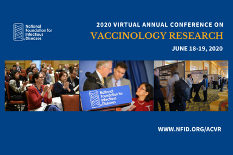Vaccinology Research is Critical — Now More Than Ever

When planning began for the 2020 Annual Conference on Vaccinology Research sponsored by the National Foundation for Infectious Diseases (NFID), the novel coronavirus (SARS-CoV-2) that causes COVID-19 had yet to emerge. Since then, the world has changed dramatically.
There have been more than 1.8 million cases and more than 100,000 deaths due to COVID-19 in the U.S. alone since December 2019, with nearly 1,000 new deaths reported each day. COVID-19 has devastated economies across the globe, and here in the U.S., more than 36 million individuals have lost their jobs. Lives have been disrupted, and cultures have had to adapt. Meetings, weddings, and graduation ceremonies are now held virtually, and wearing masks in public to prevent the spread of germs has become the norm.
As we look to the promise of new vaccines to combat COVID-19, the field of vaccinology — defined as the science of vaccines, including basic science, immune response, manufacturing and delivery technologies, and clinical evaluation — has never been more important. The science of vaccinology continues to expand, and innovations are continually being made in discovery, development, and the evaluation of vaccine safety and effectiveness.
 This work is vital. Vaccines have resulted in the eradication of smallpox globally and the elimination of polio and measles in many parts of the world. Implementation of vaccination programs has resulted in significant decreases in once common diseases. Many other challenging diseases, including chronic and non-infectious diseases, may also become vaccine-preventable or vaccine-treatable one day, as a result of continued vaccine research.
This work is vital. Vaccines have resulted in the eradication of smallpox globally and the elimination of polio and measles in many parts of the world. Implementation of vaccination programs has resulted in significant decreases in once common diseases. Many other challenging diseases, including chronic and non-infectious diseases, may also become vaccine-preventable or vaccine-treatable one day, as a result of continued vaccine research.
Each year in the U.S., more than 50,000 adult deaths are attributable to vaccine-preventable diseases. These diseases also have a significant economic cost. Influenza (flu) alone is estimated to cost the U.S. more than $11 billion each year, and the average flu illness can last up to 15 days, typically with up to a week of missed workdays. A vaccine-preventable disease that might make a healthy adult sick for a week or two could prove deadly for children, grandchildren, or other adults with certain chronic health conditions, such as diabetes, heart disease, or lung disease.
Policymakers have never had a more compelling reason to support federal funding for biomedical and public health research, including behavioral science to strengthen vaccine confidence, and improved vaccines, diagnostics, and treatments that are effective against influenza and other coronaviruses.It is also important for researchers and public health experts to have appropriate forums to share their expertise and learn from one another. The NFID Annual Conference on Vaccinology Research, which will now be held virtually on June 18-19, 2020 provides an ideal forum for collaboration and information sharing. Researchers from around the world, representing the breadth of vaccinology, will discuss the latest updates and recent scientific advances contributing to the progress of vaccine development, production, evaluation, and implementation. The 2020 virtual conference will explore:
- The rapid development of COVID-19 vaccines including efforts to ensure safety and efficacy
- The use of vaccinomics and individualized vaccinology to design and evaluate the next generation of vaccines
- Strategies used to control vaccine-preventable diseases, including smallpox, polio, and measles, with the goal of elimination and, ultimately, eradication
 To learn more and register, visit www.nfid.org/acvr.
To learn more and register, visit www.nfid.org/acvr.
The COVID-19 pandemic has been devastating to the U.S. and the world at large. As new diseases emerge and old diseases re-emerge, we will continue to see epidemics. Millions will get sick and die, businesses and economies will falter, and we will all suffer major adjustments to our traditional way of life. We do not know how or when the current pandemic will end, but we do know this: Vaccinology research will play a major role.
Marla Dalton, CAE, is Executive Director & CEO of the National Foundation for Infectious Diseases (NFID).




